https://www.kingmanshealinghooves.com
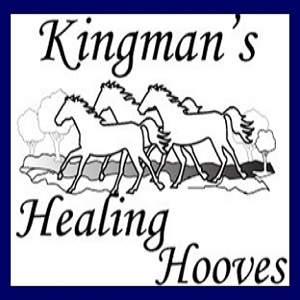
Kingman's Healing Hooves
4390 N GLEN RD
KINGMAN, AZ 86409
Mailing Address:
4390 N Glen Road
KINGMAN, AZ 86409
Phone: 928-279-7581 MAKE AN INQUIRY
View our WEBSITE
EIN: 35-2439100Founded: 2010
View our PHOTO GALLERY
Profile Last Updated April 5, 2023Public Charity
MISSION & PROGRAMS
Mission:Our mission is to improve the minds, body’s and spirits of children and adults with life-threatening illnesses, chronic pain disorders, disabilities, PTSD, at-risk youth, children of poverty/low income families, and able body riders through Equine-Assisted Activities and Therapies, and Horsemanship lessons. Joy can heal in so many ways and we strive to help in the healing process for individuals, families and friends with individual programs designed to foster the development of self-esteem, respect for themselves and others, horsemanship skills in handling and riding, as well as principles of kindness, responsibility and care for all animals.
The value Kingman’s Healing Hooves offers to our community increases tenfold when we’re able to offer services that are within reach of the entire population of Mohave County. We are a therapy facility that is a Safe Place free of judgement. We provide a social outlet for making new friendships and building confidence in those who have been victims of bullying, sexual and/or mental abuse. Through increased programs and interactions with our CHA Certified Instructors and Certified Therapy/Lesson Horses we will improve the minds, bodies and spirits of our community members.
Our organization conducts Equine Assisted Services in accordance with the EQUUS Foundation Guidelines on Qualifications of Organizations Conducting Equine Assisted Services (EAS).
Our organization provides community outreach and/or public education programs involving horses.
Our organization is directly responsible for the care and shelter of equines involved in our programs.
Over 90% of our total programs and services are equine-related.
Our organization does not CURRENTLY use satellite, overflow, foster, and/or outreach facilities.
Equine Assisted Services (EAS):
Our organization provides the following Equine Assisted Services (EAS):
Therapeutic Mounted Services
Therapeutic Unmounted Services
Equine-Assisted Learning involving Academic Learning
4: Total number of Equine Assisted Service Providers at Kingman's Healing Hooves
1. Kassie Schuerr
FACILITY PARTICIPATION:
Kingman's Healing Hooves
RELATIONSHIP: Volunteer
SERVICES PROVIDED:
Therapeutic Mounted Services
Therapeutic Unmounted Services
DEGREES, LICENSES AND/OR CERTIFICATIONS
Kassie is the Lead Professional Horsemanship instructor at the facility, her goal is to constantly improve her knowledge and practice her horsemanship in order to keep the bar at a high level. She is very dedicated to learning and sharing the knowledge she has gained. Kassie has over 36 years horse experience, AAS Degree in Exotic Animal Training and AAS Degree in Wild Life Education. She has had the opportunity to train over 15 different species of animals, using both operant conditioning and Horsemanship techniques.
Kassie has current certifications in level 3 with Certified Horsemanship Association in English, Western and Jumping diciplines.
And certified in level 2 for Riders with Disabilities with Certified Horsemanship Association.
Overview of our programs involved with providing EAS to individuals with special needs:
1. Adaptive Riding and Horsemanship—Programs are designed to suit our individual clients’ challenges and positively contributing to the physical, emotional, and social well-being of all who come to Kingman's Healing Hooves. Clients range in ages 6-seniors with grooming, groundwork and under saddle.
2. Academic Learning—Partnership with Kingman High School Special Needs Dept with monthly field trips to our facility to learn about the basics in horse safety, body parts, husbandry, grooming, walking horses and riding. Teachers assist in the program with their students.
Community Outreach and/or Public Education:
1. School Out-Reach Programs—taking horses to the local schools teaching about environment, husbandry, horsemanship, and empathy for animals and people. New S.T.E.M programs designed to spark interest in many of the equine fields.
2. School Field-Trips to our facility where they have the opportunity to learn about our environment, geology, horse husbandry, horsemanship, and empathy for animals and people. Hands on portion includes grooming, and riding.
3. Horsemanship 101 Sumer Camp-ages 6-18. This one-of-a-kind Horsemanship Camp will immerse your child in an educational and fun opportunity to experience horses on a whole new level. Taught by our CHA Certified Instructors and certified lesson/therapy horses, the camp is full of information and experiences both on the ground and under saddle.
4. Senior Moments—This program is designed to help those individuals who have developed Alzheimer’s disease, dementia, and other forms of memory loss. Services offered with grooming, groundwork and under saddle.
5. Cancer Support—We offer an opportunity to help make your day a little brighter and help cope with the stresses that cancer create in our families. Services offered with grooming, groundwork and under saddle.
6. Giving Veteran’s a Purpose—Offering horsemanship sessions and volunteer opportunities for those suffering from PTS/PTSD, physical challenges, and those who would like to progress with personal equine goals. Services offered with grooming, groundwork and under saddle.
7. Volunteer program--offers an opportunity for volunteers ages 10 and up to receive the full experience of equine care from husbandry, training, and assisting in lessons. As our volunteers learn safety and cues to communicate with our horse team effectively on the ground, they are then moved up into exercising, riding, and more of an assistant training type activities.
Research/Medical Use of Equines:
Our organization has never made, and would not ever consider making, equines available for research studies or medical training that involves invasive procedures and/or that which may cause pain or suffering to the equine.
Religious Affiliation:
Our organization does not promote religious education, religious purposes, or a specific religious faith or use donations for religious education or religious purposes; require participants to be of a certain faith; require participation in religious, instruction, activities or services; or require participation in prayer, worship, religious instruction or other religious activities as a condition of receiving social or secular services offered.
Auction Donation:
Our organization has never allowed, or would not consider allowing, an equine to be sold, transferred, released, or otherwise placed into possession of any person or organization that would cause or allow the equine to be sold at auction for slaughter.
Our Programs/Activities that are not equine-related and/or involving animals other than equines:
The programs remain the same while utilizing our miniature horse first and then introduce the other animals which include a certified E.S.A./Service dog, a pygmy goat and a miniature Zebu calf. We utilize these animals to bridge the gap, build confidence, and create a sense of belonging if unable to participate with our larger horses. Large animals can be intimidating to many and we have found we are able to reduce anxiety and fears by incorporating these smaller versions.
POLICIES: ACQUISITION
Our organization acquires horses/equines from the following source(s):
Donation
Our organization does not acquire horses/equines from the following source(s):
Lease
Purchase from Owner
Auction
Kill pen/Feedlot
Return
Surrender
Seizure
Abandonment
Our organization will accept the following:
Geldings
Mares
Not Checked:
Pregnant Mares
Foals
Stallions
Only Stallions to be castrated
Additional information about our acquisition policies and practices:
Horses must be in good health, good feet, good mind. We do all of our training ourselves and will except those horses that make the process easier by having the following criteria.
POLICIES: INTAKE, ASSESSMENT & TRAININING
Prior to a horse being accepted and/or arriving at the facility, the organization requires the following with respect to the health status of the horse:A current Coggins
Vaccination records that have been administered within the last 12 months
If health records are not available or are out-of-date, the owner is responsible for having vaccinations administered.
If health records are not available or are out-of-date, our veterinarian will administer appropriate vaccinations
A health certificate signed by a veterinarian and dated no more than seven days prior to arrival is provided to our organization either prior to or upon arrival of the equine attesting to the health status of the equine
Prior to a horse being accepted and/or arriving at the facility, the organization has the following policies in place:
The owner of a potential equine is interviewed over the phone or in person prior to seeing the equine
The equine is evaluated at its place of residence
The owner completes an application/contract which constitutes the agreement between the owner and our organization
The owner is financially responsible for the shipping of the equine to and from the organization
Equines are not taken on trial
Following arrival of the equine at the facility, the following is performed:
A Henneke Body Conditioning Score or other body conditioning score is assigned
Physical examination by trained barn staff
Photographs are taken of each equine upon arrival at the facility and kept with the equine's health records
Vaccinations
De-worming
Physical examination by a veterinarian upon arrival
Physical examination by a farrier
Physical examination by a dentist
Coggins test
Blood work other than Coggins
Fecal test
The equine is scanned to check for a microchip
The equine is microchipped if the scan indicates that there is no microchip
Upon intake, the organization has the following quarantine policy in place:
The equine is confined to a designated and separate area for isolation and quarantine at the facility for a prescribed period of time
The equine is confined to a designated and separate area for isolation and quarantine off-site for a prescribed period of time
The equine is not quarantined
The typical length of quarantine is: 20 to 30 days
Horses are assessed for following skills and behaviors:
Retrieval from a pasture/paddock
Leading with a halter and lead rope
Temperament, disposition and attitude, such as rated from very calm to very high spirited
Saddling
Bridling
Lunging
Loading onto and unloading off a trailer
Mounting and dismounting
Riding at the walk
Riding at the trot
Riding at the canter
Riding by a beginner and/or unbalanced rider
Tolerance to unusual objects and loud noises
Known vices, i.e., cribbing, biting, kicking, weaving, stall walking, etc
Grooming
Bathing
Clipping
Tolerance to multiple handlers at the same time
Jumping
Driving (Pulling a carriage)
Our organization has the following policies and procedures in place pertaining to the ongoing assessment of horses in its care:
Physical examination by a veterinarian at least annually
The Henneke Body Condition score or other body conditioning score is updated at least annually
Photographs are taken of each equine annually and kept with the equine's health records
Equines at our facility may be treated by an equine chiropractor
Equines at our facility may be treated by an equine massage therapist
Photographs are taken of each equine monthly and kept with the equine's health records
Equines at our facility may be treated by an equine acupuncturist
Equines at our facility may be treated by an equine nutritionist
Our organization evaluates at least annually and maintains a written record of the weight-carrying and workload limitations for each equine that is ridden
Our organization does not evaluate the weight-carrying and workload limitations for each equine that is ridden
No equines are ridden; not applicable
The following variables are considered in determining the weight-carrying and workload limitations for each equine that is ridden:
Equine age, weight, breed, body condition, fitness, balance, health and soundness
Equine conformation to include the top line, length of back, strength and width of loin, bone density (measured by the circumference of the cannon bone just below the knee)
Size, shape, condition and angle of the hooves
Participant weight, height, body proportions, balance, fitness and riding skills as well as behavioral issues and safety concerns
Weight and proper fit of the saddle and other equipment
Terrain and footing in the working environment
Duration and frequency of working sessions, as the frequency with which an equine is subjected to maximum weight carrying and/or workload
Temperature and/or weather conditions
Nature and pace of work, repetitive or varied, radius of turns, degree of incline and regularity of footing when equine is subject to maximum weight-carrying capacity
Seasonal impact on the equines' workload and weight-carrying capabilities and limitations
Our organization does not evaluate the weight-carrying and workload limitations for each equine that is ridden
No equines are ridden; not applicable
Horses provided formal training (groundwork or riding): 2-3 times per week
Additional information about our intake, assessment & training policies and practices:
When horses are accepted, we receive them from local owners so we are able to examine prior for any illness to minimize quarantine. We currently have a full barn and do not plan on acquiring any more horses at this time.
POLICIES: BREEDING
The organization has the following policies related to breeding and stallions:Our main facility where our organization conducts its programs does NOT breed equines.
One or more of the facilities where our organization conducts its programs, including foster facilities, breeds equines
One or more of the facilities where our organization conducts its programs, including foster facilities, are permitted to house stallions
POLICIES: EUTHANASIA
The organization has the following policies related to euthanasia:Our organization will never have an equine euthanized for space
Our organization will have an equine euthanized upon the recommendation of the veterinarian if the equine is a threat to itself, other equines, or people
Our organization will have an equine euthanized upon the recommendation of the veterinarian after all reasonable treatment options have been explored
Euthanasia is done on site when possible to decrease trauma from transport
Disposal of the carcass is handled within 24 hours
Our organization will never have an equine euthanized under any circumstances
Euthanasia is done at the veterinarian's facility
The following are authorized to administer the procedure for your organization in accordance with state laws:
Veterinarian
A certified euthanasia technician
Senior staff with appropriate training
Employee of animal control shelter or humane society with appropriate training
Veterinary student under the supervision of a licensed veterinarian
Not applicable. Our organization prohibits euthanasia under any circumstances
Additional information about our euthanasia policies and practices:
We are very sensitive of our clients reactions to the euthanasia of our horses, we do not take this decision lightly as many people and the horse herd are affected. For the safety of our clients and horses, the decision falls upon our Director and our facility veterinarian.
All avenues are exhausted in the best interest of the horse, we will not allow for an animal to be subject to a horse sale and/or slaughter situation.
POLICIES: RE-HOMING
Re-homing Agreement not applicable.Our organization has the following re-homing (adoption/purchase) policies and procedures in place:
The organization does not re-home equines under any circumstances; our organization retains custody of our equines and ensures care of the equines for their lifetimes.
Our organization has the following policies and procedures related to horses that need to be retired, are no longer able to contribute to the mission of the organization, and/or are no longer manageable:
The organization does not re-home equines under any circumstances; our organization retains custody of our equines and ensures care of the equines for their lifetimes.
Equines may remain at our organization for their lifetimes
In the case an equine is unsound and/or unhealthy and cannot be treated to relieve suffering, the equine may be euthanized upon the recommendation of the veterinarian
Equines may be found suitable homes by our organization
Equines may be returned to their owners
Equines may be sent to auction
In the case an equine is unmanageable and demonstrates repeated dangerous behaviors, the equine may be euthanized upon the recommendation of the veterinarian
If a suitable home cannot be located within 12 months, the equine may be euthanized
The organization will accept financial responsibility for equines in the current care of the organization that need to be retired or are no longer able to contribute to the mission of the organization if all alternatives have been explored to find the equine an appropriate placement and space is not available for the equine to remain at the organization.
Additional information about our rehoming policies and practices:
As our horses age, we will utilize them in minimal aspects of our programs as they will continue to need grooming and exercise. We have a very diverse program and not all horses are in the riding program, the older horses (which Whiskey Peete and Haywire already participate in) are the EAL and educational presentations for body part demonstrations. When the time comes for the proper care and euthanasia of the horse, this decision will be determined on a case-by-case basis. We will then, at that time, consider bringing in new horses into the program for replacements. We also have access to construct more pens for holding.
EQUINE CARE & SHELTER/FACILITY INFORMATION
Total facilities at which our organization cares for and shelters horses used in our programs: 1Our organization does not CURRENTLY use satellite, overflow, foster, and/or outreach facilities.
Kingman's Healing Hooves
4390 N GLEN RD KINGMAN AZ 86409
Contact: Kassie SCHUERR
Contact's Phone: 928-279-7581
Contact's Email: kingmanshealinghooves@gmail.com
Currently operational
Total number of horses/equines currently involved with your programs, under your care, and/or owned by your organization at this facility: 12
Total number of horses at this facility INCLUDING those counted above: 13
Maximum capacity of horses at this facility: 16
Does your organization own, lease or use a part of this facility? Use
Provide the contact information for the individual or organization responsible for investigating abuse in the county where the facility is located, including mailing address, email address, and phone information.
Mohave County Sheriff Dept. 600 W Beale St, Kingman, AZ 86401 (928) 753-0753 Barry Baehr--Arizona Livestock Inspector 928-727-9797 The Animal Service Division Department's Dispatch at (623) 445-0281
Does your organization conduct Equine Assisted Services (EAS) at this facility in accordance with the EQUUS Foundation Guidelines on Qualifications of Organizations Conducting Equine Assisted Services (EAS)? Yes
Total number of Equine Assisted Service Providers AT THIS FACILITY, including instructors, specialists, therapists, counselors, coaches and/or facilitators (full-time, part-time, volunteer, independent contractors, and/or providers accompanying clients) that conduct Equine Assisted Services (EAS) in accordance with the EQUUS Foundation Guidelines on Qualifications of Organizations Conducting Equine Assisted Services (EAS) AT THIS FACILITY: 4
Equine Assisted Service Providers Assigned to this Facility: (see Equine Assisted Service Provider Section below for details)
1. Kassie Schuerr
4 -> 1 - The total number of Equine Assisted Service Providers entered for this facility does not match the number of Equine Assisted Service Providers assigned to this facility under in the Equine Assisted Service Provider Section
Additional information about this facility:
Horses are sheltered and fed in pens. The pens are then opened to the arenas for turn out access.
Kingman's Healing Hooves
Veterinarian Information
Veterinarian: Dr. James Anderson
Clinic Name: Manzanita Animal Hospital
2323 Detroit Ave
Kingman AZ 86401
Phone: 928-753-6138
Overview: Kingman's Healing Hooves (*Main)
Total number of horses/equines currently involved with your programs, under your care, and/or owned by your organization at this facility: 12
Total number of horses at this facility INCLUDING those counted above: 13
Maximum capacity of horses at this facility: 16
Total acreage dedicated specifically to the horses: 1
Our organization has use of the following at this facility:
Structures/Barns: 0 Run-in sheds: 0
Pastures: 0 Paddocks/Pens/Turnout Areas: 13
Uncovered Outdoor Rings: 2 Covered Outdoor Rings: 0 Indoor Rings: 0
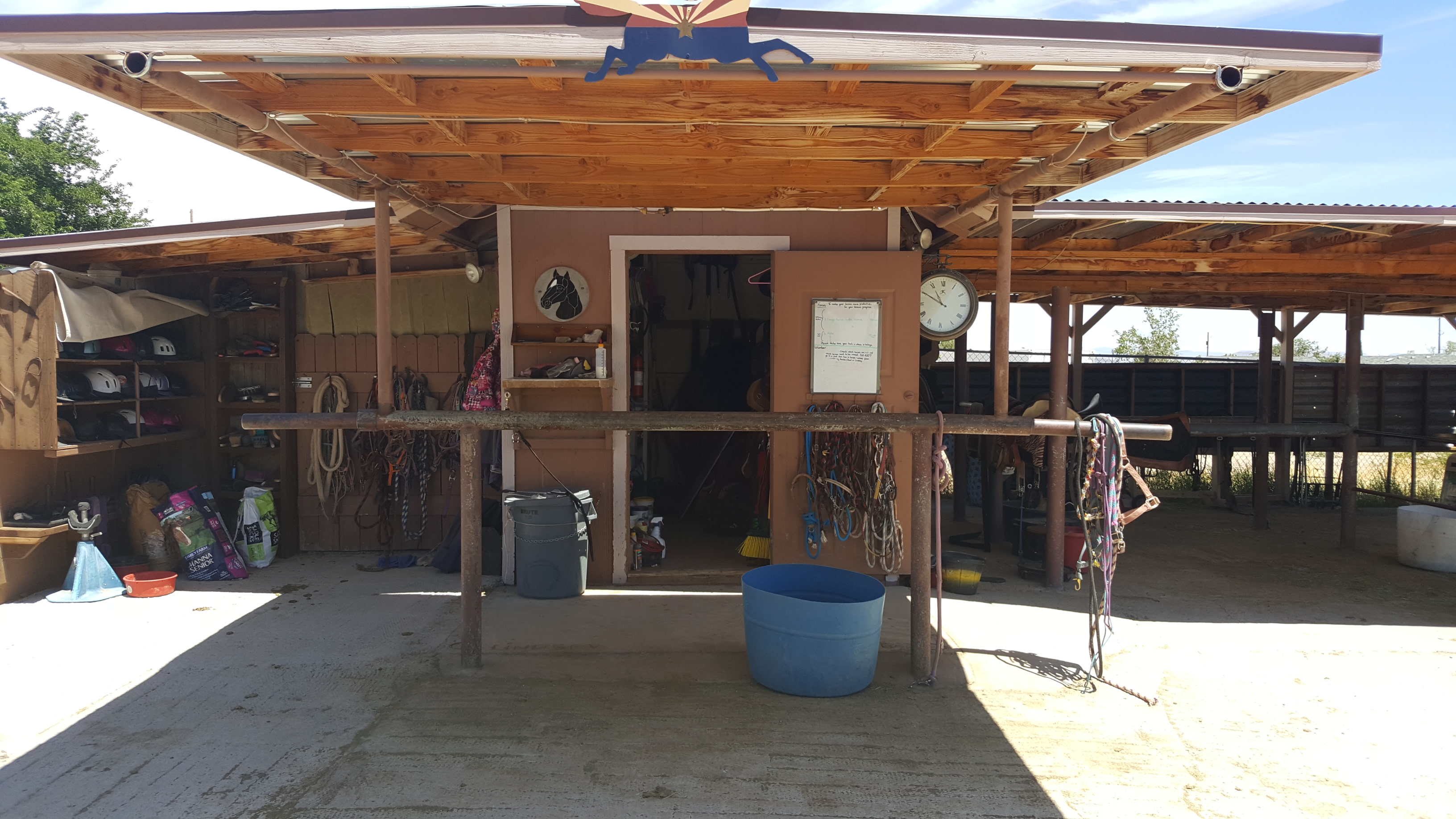
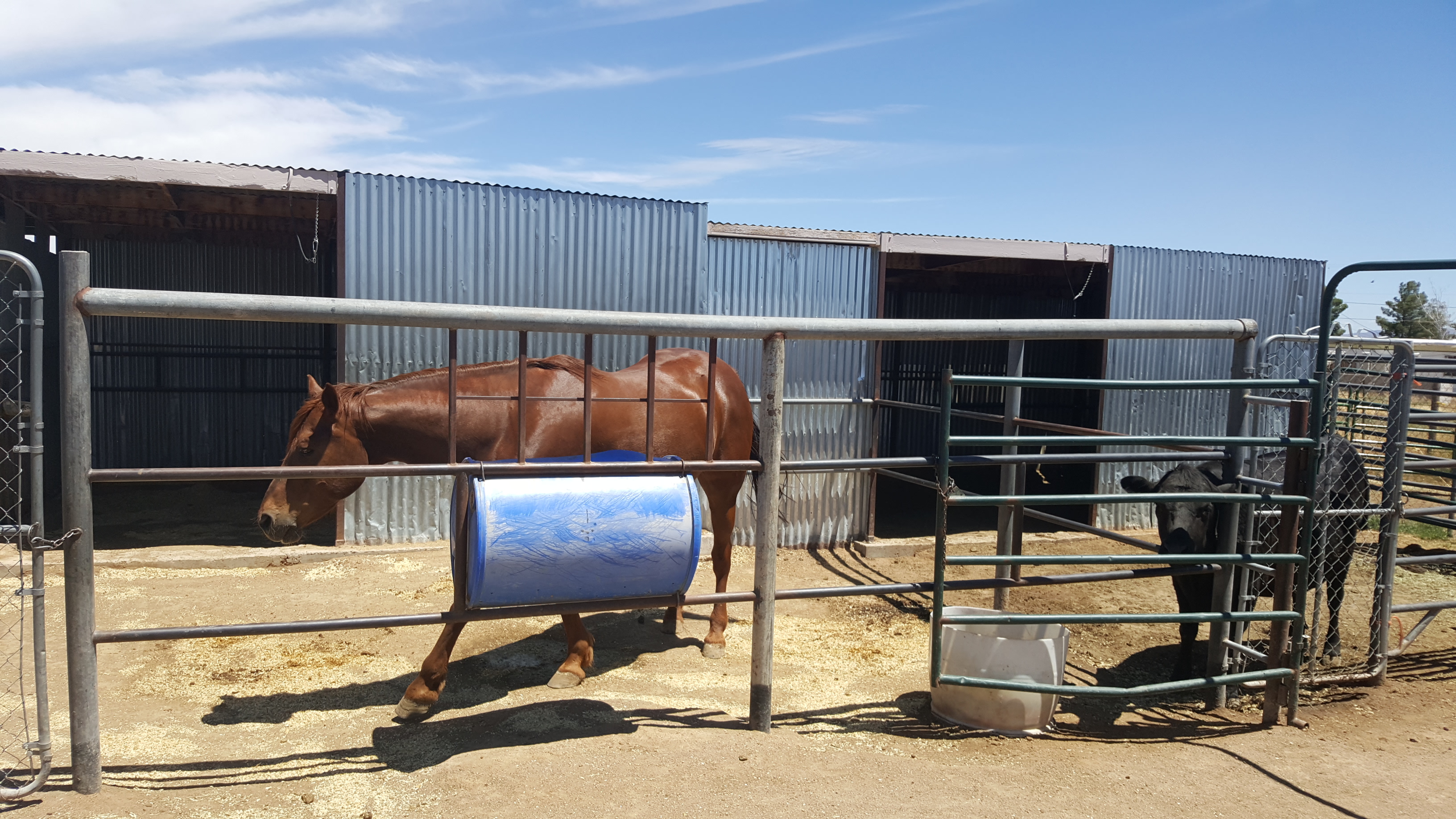
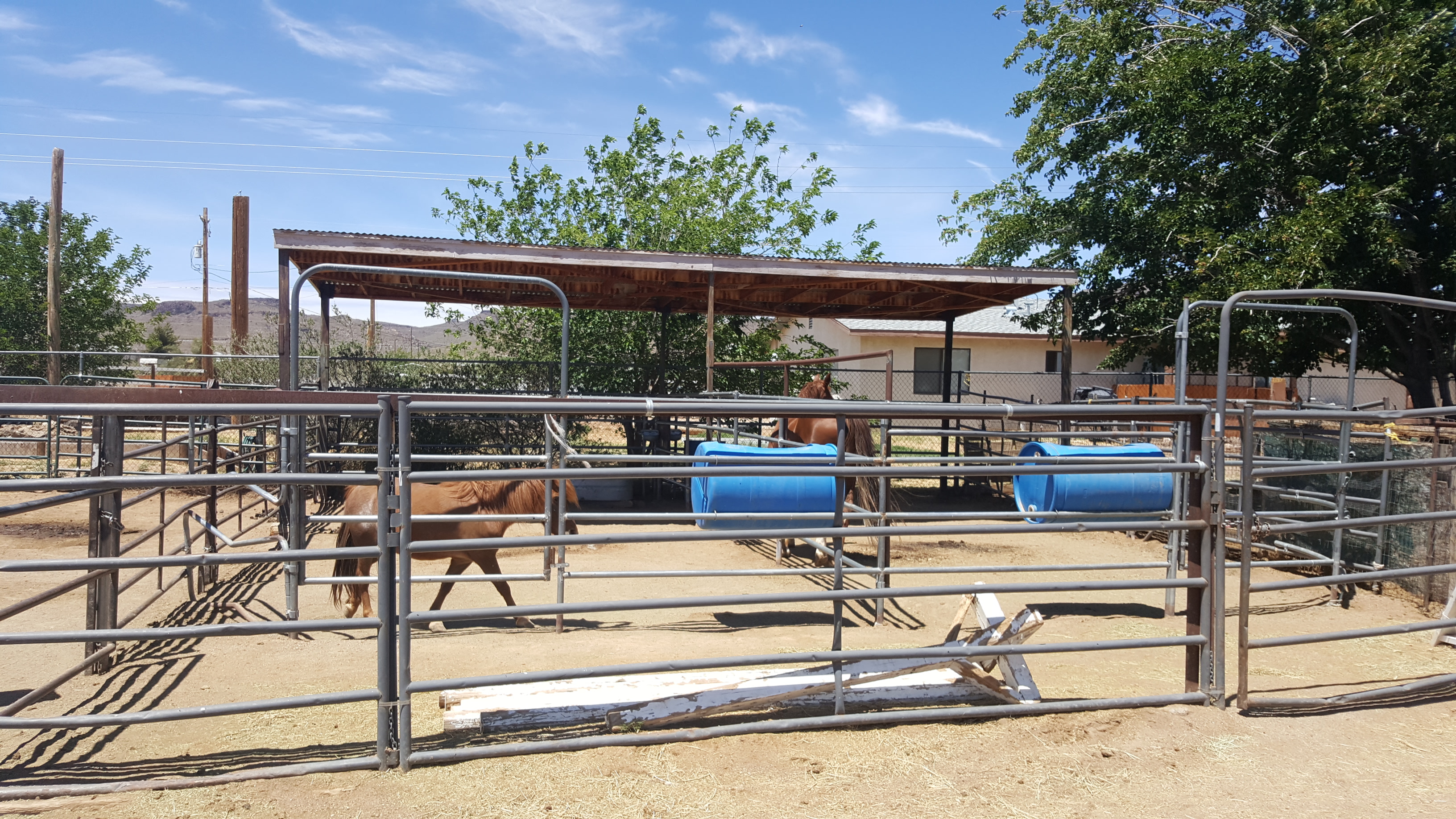
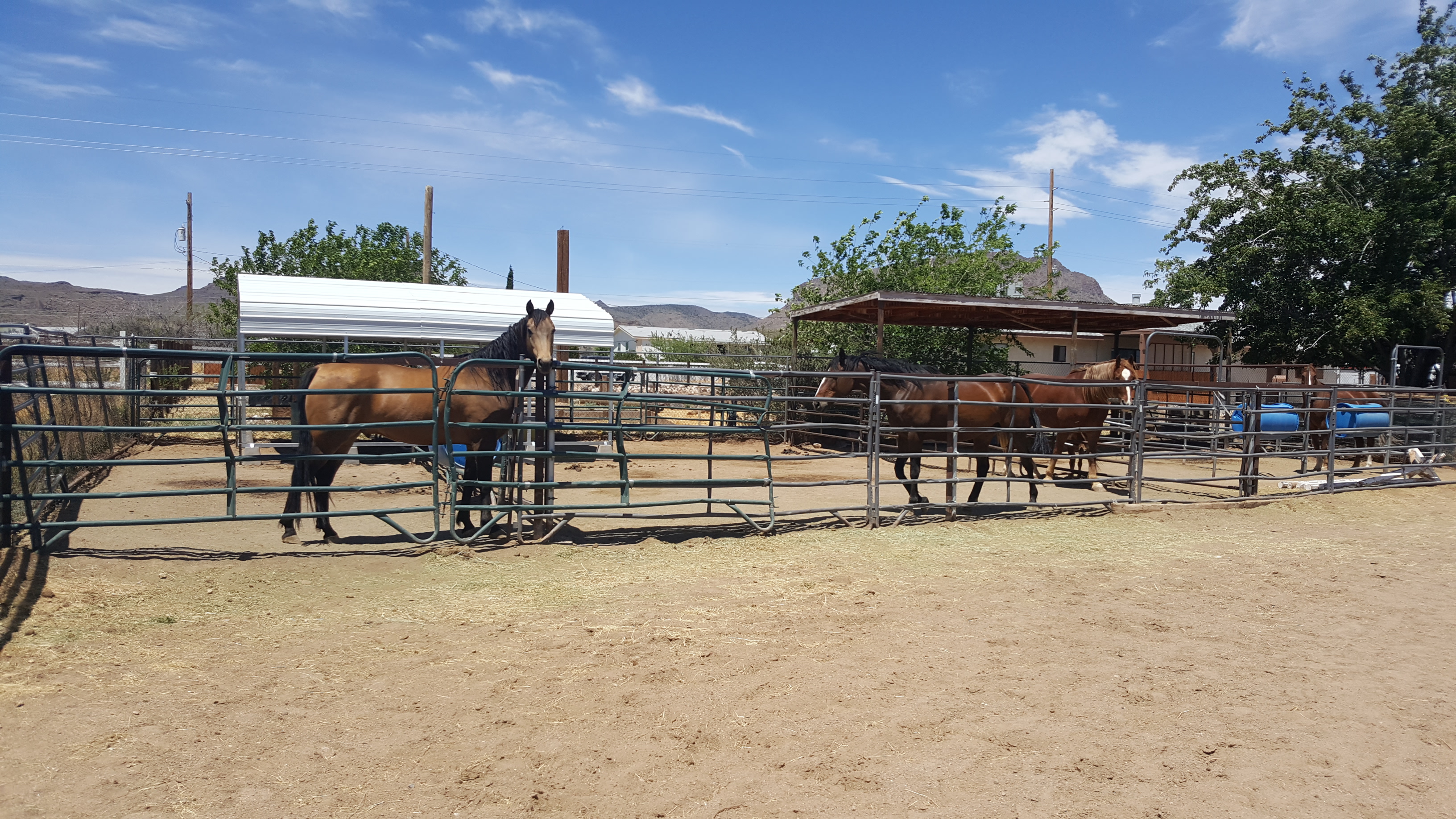
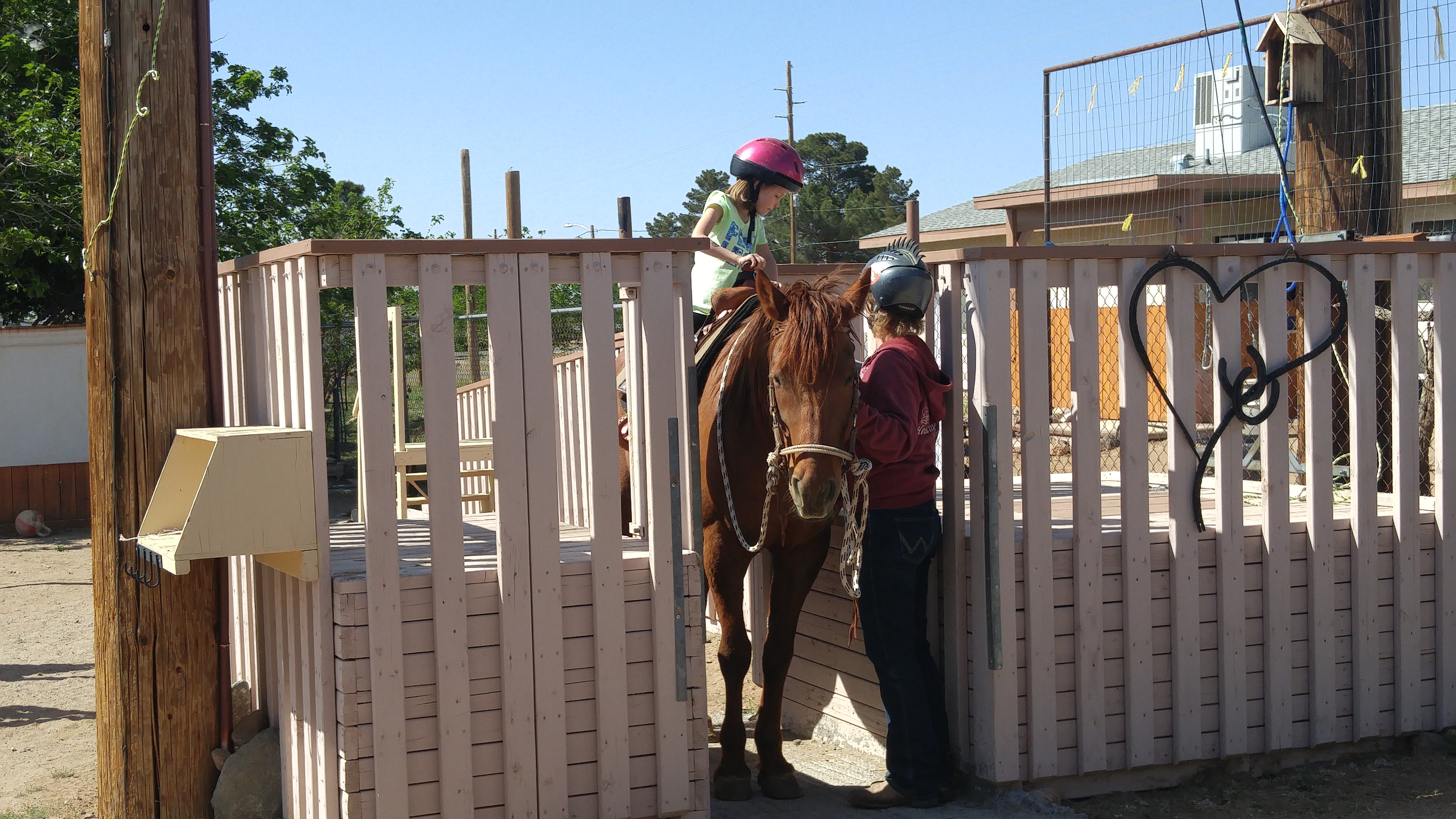
How many hours per day, on average, are horses turned out:
Equines are out 16+ hours per day
Equines are out 24/7 except they are brought in to feed
The following describes the pastures at this facility:
This facility does not have pastures where equines can graze on pasture grass
This facility has a written plan in place for pasture management, which includes guidelines for seeding, fertilizing, irrigation, mowing, dragging, harrowing, manure removal, removal of debris, the control of poisonous plants, and a schedule for cleaning
A dedicated staff person(s) is responsible for pasture management
All pastures are fenced to prevent escape or injury
Barbed wire is used for fencing
Electric fencing is used; electric wires or tape fence are visibly marked
Fencing checks, such as broken or missing planks, loose fence posts, exposed or loose nails, detached wires, etc., are done regularly
Pastures are rotated
Pastures have natural protection for equines (i.e., trees)
Pastures have man-made protection for equines (i.e., shelters)
The following describes the turnout areas other than pastures at this facility:
This facility has a written plan in place for the maintenance of turnout areas, which includes a schedule for cleaning, manure removal, and dragging
A dedicated staff person(s) is responsible for the maintenance of turnout areas
All turnout areas are fenced to prevent escape or injury
Fencing checks, such as broken or missing planks, loose fence posts, exposed or loose nails, detached wires, etc., are done regularly
This facility does not have turnout areas
Barbed wire is used for fencing
Electric fencing is used; electric wires or tape fence are visibly marked
Turnout areas have man-made protection for equines (i.e., shelters)
The following policies and procedures are in place at the facility to restrict public access and to keep horses safe:
The property owner, staff member or caretaker lives on the premises and ensures that public access is restricted and is responsible for the security of the facility and equines
By Appointment Only signs are posted.
No Trespassing signs are posted
Hold Harmless signs are posted
Authorized Personnel Only signs are posted
Entrance gates are locked at night
Visitors are only permitted at specific times
Visitors are only permitted in specific areas
The property is fitted with motion lights
The property is fitted with a security system that is monitored internally by staff (or the property owner)
The perimeter of the property is fully fenced
A security guard is present at night
Equines are checked overnight
The property is fitted with a security system monitored by police or a professional service
Equine Care/Emergency Preparedness: Kingman's Healing Hooves (*Main) 2024 and 2023 This section is required.
Horse Health Care/Barn Management Records: What system is used to collect and store health/horse care records?
Notebook or equivalent (technology not utilized)
The organization utilizes its own system to maintain records
The following items are consistent with our feed management plan and practices:
Equines are provided with individualized feeding plans, including supplements, according to age and any health issues
Equines are fed in individual stalls
Staff and volunteers are trained in proper feed measurements and protocols and observed periodically to ensure they are feeding correctly
The feed chart is centrally located and updated as needed
The area(s) where hay, feed, grain, and supplements are stored are kept clean, free of debris and chemicals, and protected from weather and other animals in rodent-proof and mold-proof containers and grain bins
Feed, supplements and hay types are clearly labeled
Water sources, i.e., buckets, troughs, automatic waterers, etc. are kept clean, free of debris and chemicals, and protected from weather and other animals
Medications are kept in a locked, climate-controlled area
Feed plans are determined in consultation with a veterinarian
Supplement plans are determined in consultation with a veterinarian
Equines are fed in groups
Do horses have access to clean drinking water at all times? Yes
Hoof Care: How often is hoof care provided for each equine? Every 4-8 weeks and when an issue arises
Dental Care: How often is dental care provided for each equine? Annually and when an issue arises
Horse checks: How often are equines visually and physically checked by personnel at the facility? Every day or 6 days a week
Parasite Control: Our organization has the following worming protocols in place: (Check all that apply
Fecal testing is performed prior to the use of a de-wormer.
Fly/Insect Control: What remedies are used to control flies and insects?
Fly Traps and Tapes
Fly Spray Repellent
Fly Masks
The following represent the biosecurity practices in place at facility:
Our organization follows the biosecurity guidelines of our veterinarian
Sick, affected and/or quarantined equines do not have contact with other equines or other animals
All staff are trained in best practices related to biosecurity
All volunteers are trained in best practices related to biosecurity
A specific individual is assigned to care for sick, affected and/or quarantined equines
Sick, affected and/or quarantined equines are cared for last if the caretaker must also care for healthy equines
Sick, affected and/or quarantined equines do not have contact with other equines or other animals
Restricted access signs are posted at primary points of access to sick, affected and/or quarantined equines
Hand sanitizers and footbaths are available at all primary points of access to sick, affected and/or quarantined equines
Manure and bedding from sick, affected and/or quarantined equines is disposed of in specific areas designated for infectious materials - not put in open air piles, and not spread on pastures
Stalls, aisle ways, and common areas are disinfected after conclusion of the quarantine
Trailers/vans used by sick, affected and/or quarantined equines are cleaned and disinfected after each use and cleaning takes place away from where equines are sheltered
Equipment used by sick, affected and/or quarantined equines is not shared and is clearly labeled
Shared equipment used by sick, affected and/or quarantined equines is cleaned of organic debris and disinfected after each use
Latex gloves are worn when working with sick, affected and/or quarantined equines
Personnel are required to leave the facility (or shower and change clothing) after working with quarantined equines
Our organization follows the AAEP's Biosecurity Guidelines and/or the UC Davis Biosecurity Guidelines
The organization has a written biosecurity plan
Equines are not quarantined on arrival.
Additional information on biosecurity:
We also have portable panels to create additional quarantine pens if needed.
The following represent the manure removal practices in place at facility:
Manure is stored in dumpster(s)
Manure is hauled, sold or given away
Manure is piled in an area where equines are not located
Manure piles are covered
Manure piles are composted or spread on pastures
Our organization adheres to the manure management guidelines set by state and/or local authorities
The following steps are taken to help staff and volunteers readily identify each horse on the property:
Equines are assigned the same stall/location each day
A notebook or binder with photos and information on each equine is easily accessible
Equine photos and profiles are available on the website
Staff/volunteers are provided training on conformation, markings, colors, and breeds
Team leaders work with new staff/volunteers until they are able to identify the equines
Name plates are located on the stall
Photos are located on the stall
Equines wear halters with nametags
A map/diagram is posted showing the location of each equine with equine names and photos
Staff and volunteers are provided with an information packet with equine profiles, including photos and detailed descriptions
Our organization has the following policies and procedures in place pertaining to tack, apparel and equipment:
Saddles are shared
Saddle pads are shared
Bridles are shared
Bits are shared
Blankets are shared
Sheets are shared
Blankets, sheets and turn out apparel are fitted and utilized for each equine appropriate to the equine's needs and the weather conditions
Blankets, sheets and turn out apparel are cleaned regularly as needed
Halters are shared
Tack is cleaned weekly
Tack is inspected for overall working condition before each use by trained personnel
Tack is assessed for fit before each use by trained personnel
Tack is assessed for fit by trained personnel when an equine's body condition changes
Tack is assessed for fit by trained personnel when an equine's disposition changes
Tack is stored in a climate-controlled location
Helmets are shared
Helmets are cleaned/disinfected after each use
Helmets are replaced after a fall
Helmets are replaced at least every five years.
All equines have specifically assigned tack, apparel and equipment that is not shared
Turnout apparel is shared
Tack is cleaned after each use
Tack is cleaned only when needed
This facility enlists the services of a professional saddle fitter at least once a year
Assigned tack is clearly labeled
No equines are ridden; not applicable.
Emergency Preparedness: Kingman's Healing Hooves: *Main This section is required.
The following plans, policies, and procedures are in place at the facility to handle emergencies and address weather related issues, fire safety procedures, and/or any additional hazardous scenarios the facility could potentially experience:
Emergency procedures are posted prominently
Emergency phone numbers are posted prominently
The facility maintains at least two weeks of hay, feed, shavings and medications
The facility collects and maintains medical information from staff, volunteers, and clients
The facility maintains appropriate liability and/or workers' compensation insurance
All staff/volunteers are briefed regularly on emergency preparedness/safety procedures
The organization has a written emergency preparedness/safety plan (EPP)
The facility owns or has access to a generator
Local fire department and/or the state's emergency planning department procedures
Medical emergencies for clients, staff, and volunteers
Medical emergencies for equines
Evacuation plans
Power outages
Fire
Natural Disasters - thunderstorm, hurricanes, earthquakes, tornados, etc
Protocols to notify emergency personnel
Building/facility exit plans
Terrorist attacks
The facility follows the specific procedures to help PREVENT emergency situations:
Smoking is strictly prohibited
NO SMOKING signs are posted prominently
Hay is stored away from permanent or temporary structures where equines are stalled
Permanent or temporary structures where equines are stalled are kept free of dust, cobwebs, trash, cleaning rags, and other flammable items
Aisles and doorways are kept clear
Heaters with automatic shutoff settings are used
How often are the following checked or performed?
Fire Extinguishers are checked: Semi-annually
Smoke detectors are checked: Not at all/NA
Electrical Systems are checked: Semi-annually
Fence lines are checked: Daily
Turnout Areas are checked: Daily
Sprinkler systems are checked: Not at all/NA
Fire drills are conducted: Annually
Review of safety protocols with staff are conducted: Quarterly
Review of safety protocols with volunteers are conducted: Daily
The Emergency Preparedness Plan is reviewed and updated: Annually
Equine Transportation
2-horse van/trailer with truck:
1 Owned onsite Access onsite but not owned 0 Access offsite;
3-horse van/trailer with truck:
1 Owned onsite Access onsite but not owned 1 Access offsite;
4-horse van/trailer with truck:
Owned onsite Access onsite but not owned 0 Access offsite;
6-horse van/trailer with truck:
Owned onsite Access onsite but not owned 0 Access offsite;
8-horse van/trailer with truck:
Owned onsite Access onsite but not owned 0 Access offsite;
10-horse van/trailer with truck:
Owned onsite Access onsite but not owned 0 Access offsite;